Life and Leisure
Home is truly where the heart is
By Liu Yujie (China Daily)
Updated: 2010-10-10 09:05
 |
Large Medium Small |
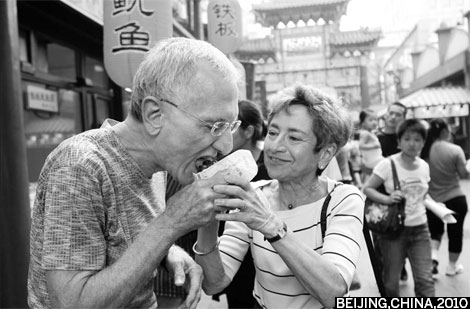
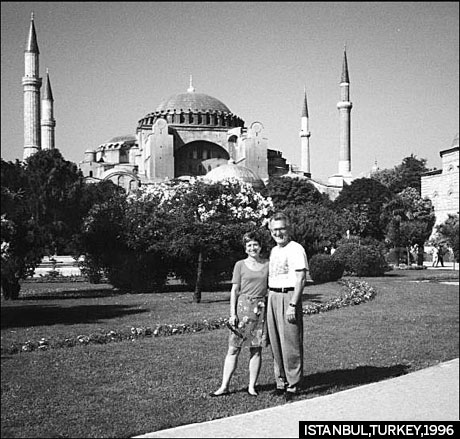
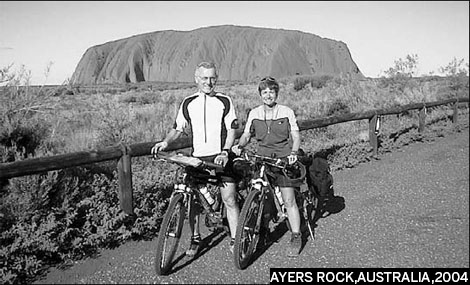
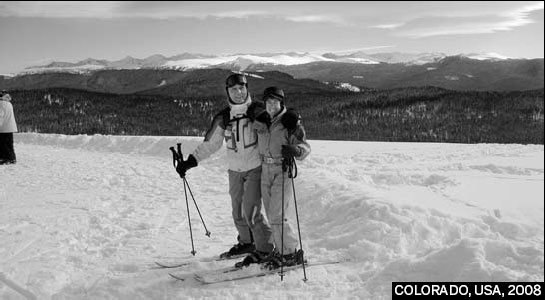
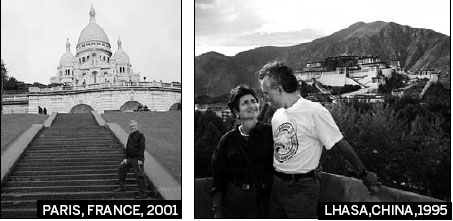
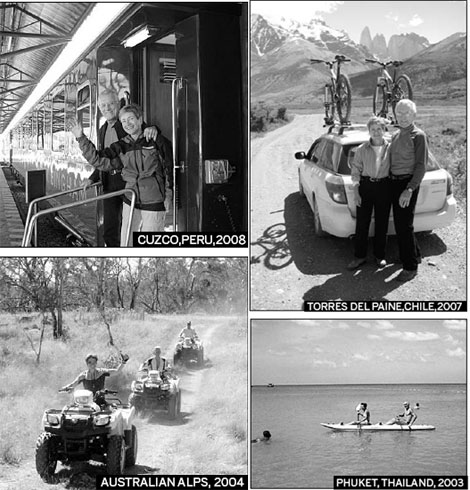
When two hearts meet, wonderful things happen. Liu Yujie meets a pair of global meanderers, who have been traveling non-stop for the last 15 years.
Audre Engleman and Dimitri Moursellas met on a blind date in Los Angeles in 1989. Both were single, never been married and had busy careers which took them all over the world. By the time 1995 came around, they were both ready for a much longer commitment ?to travel the world together, unencumbered by worldly possessions. They sold their houses and cars and started on what is now a 15-year trek across nations on five continents.
Audre is now 64 and looks 10 years younger, while Dimitri at 71 is still very bright-eyed and enthusiastic about food and travel, and they have been eating and traveling for the last decade and a half.
Currently, they are in Beijing, living in a cozy service apartment right next to the Oriental Plaza and a stone's throw from Tian'anmen Square.
"When people ask us where we are from, we can't answer because we are from the place we are at the moment. We are from here," Dimitri says, laughing.
For the longest time, they have tried to find the right phrase to describe what they do. They initially described themselves as people who "love travels throughout the world". From this comes the title of their blog, travelloveaffair.
"People actually helped us in finding the right title. Last summer in Canada, we were at the real estate agent's trying to get an apartment. Somehow, out of his head, he said 'meanderers'. And I said 'Yes! That's it! Global meanderers. Excellent!'" Dimitri says.
"Globe-trotters, vagabonds, hobos, nomads, gypsies. None of those words are correct. We're very different," says Audre.
Trotters travel fast, but the couple prefers a slower pace. Nomads live in tents, but Dimitri and Audre like to live in comfortable accommodations. But, they are not normal travellers who live in hotels. It's easy to book a hotel and simply use all the services it offers, but they prefer living in apartments, which means they have to find shops to buy food, to cook.
"It's much more like living here," says Dimitri.
Audre documents the details of their travels in their blog. Food is a major subject. They call themselves "foodies" and "travel eaters" and they like to experience different cities through their palates.
The energetic couple makes it a point to go to the gym three times a week and they also do a lot of mountain biking and skiing. They are proficient skiers who have spent 11 ski seasons everywhere in the world during the past 15 years of traveling.
Living like locals
Aside from a little sports and sightseeing, what they do in each city is no different from the locals. In Beijing, their average week may include a day at the Capital Museum (which they thought was fabulous), a day shopping for eyeglasses and a visit to the dentist on another.
Through an organization called Conversation Exchange, Dimitri and Audre have met a few young people in Beijing eager to improve their English.
They come from totally different backgrounds. One is an English teacher who lives with her family, another a young sales executive who is married and owns a house and a car, and a third who is a computer engineer.
"It makes Beijing more understandable for us, and we see the new China through the eyes of these young people as well as through our own eyes," says Dimitri.
It started in Istanbul
The couple's global meandering started in 1995 when they went to Istanbul on a nine-month trip with all of their suitcases, straight from a work assignment in Indonesia.
They traveled up through Singapore into Vietnam, and then north to China's Southwest, and to Nepal.
Finally, they cut across to Egypt. They stayed in Turkey for nine months, and spent four months in Istanbul and another four driving through Turkey.
"Actually we went down Dimitri's memory lane, and I saw his school, his apartment, his house, the building his father had lived and worked in Egypt. It was amazing and I loved it," says Audre.
That's when Dimitri did some calculations and suggested they both retire and travel full time.
"I was 49 and Dimitri, 56. We both loved traveling, but it was still astounding to think it was possible to retire. I figured that even if I have to go to work at McDonald's till I was 90, this was the thing to do when I was 49."
The idea sounded pretty radical at first. Most people couldn't do it because they have parents, children, houses and cars to support.
Though neither was rich, both Audre and Dimitri had saved for years. They had normal jobs, with Audre being a lawyer and Dimitri a computer software developer.
Neither had ever been married before and there were no children. Their parents had all passed away by the time they met.
Their houses were already rented out in the United States because they had been working in Indonesia for a couple of years. They had their furniture in storage.
So, after selling off houses and cars, Audre and Dimitri packed all their belongings in 11 suitcases, and found themselves free to move anywhere at any time.
Being Greek, Dimitri says, brings out the travel in his blood, just like Ulysses. And although he had done some trips between jobs, the only way to fully enjoy traveling was with someone close.
"Audre is my partner and we are having a good time together. Without her, I couldn't imagine doing this. It has to be together," Dimitri says, happily patting his wife's head.
They have also got their financials sorted out.
"In some ways, it is cheaper to rent than to buy an apartment. But you need to take risks. You should be willing to not have a home, not have a place to go back to when the world crashes down.
"So far within our budget, we have been able to find very nice accommodation and we never have to live on negative income," says Audre.
However, during their 15 years of travel, the US stock market did crash twice.
"The theory is that we are supposed to live not on our savings, but on the appreciation of our savings. Whatever the savings grew last year, that was what we were supposed to spend. So when the stock market is down, we are just more careful," says Dimitri.
In the last big financial crash in 2001, they went from Europe, where everything was expensive, to India, where they had a big house with five bedrooms, two servants and a swimming pool.
And for all that, they paid $50 a day.
Each time before they move, Dimitri does a lot of research on the Internet to identify possible apartments to live in, to book plane and train tickets in advance to get the lowest discounts and to find a place to store their car and bicycles.
"Looking for a new place to live has become part of our daily routine. When I'm making breakfast or taking a shower in the morning, Dimitri spends that time at the computer doing Internet searches. He's been doing this for 15 years and is really good at it," says Audre.
On arrival in Beijing, they stayed in a hotel for a week while Dimitri found and examined at least 15 apartments. He compared their prices and conditions to get the best value.
In order to keep their luggage light, they have learned to shed their belongings.
One particular summer, Dimitri scanned all their photo albums and Audre's cookbooks and put them into the computer. All of their music also became digital.
After Beijing, where do they go next? And when do they plan to settle down?
Dimitri and Audre are heading back to the States and Colorado soon for the winter skiing season, after which they plan to drive down to Mexico and explore South America.
As to when and where they will finally settle, they smile and say there is no answer to that.
"As long as we are physically able, we are going to keep doing this until we go to our retirement homes," Audre says.